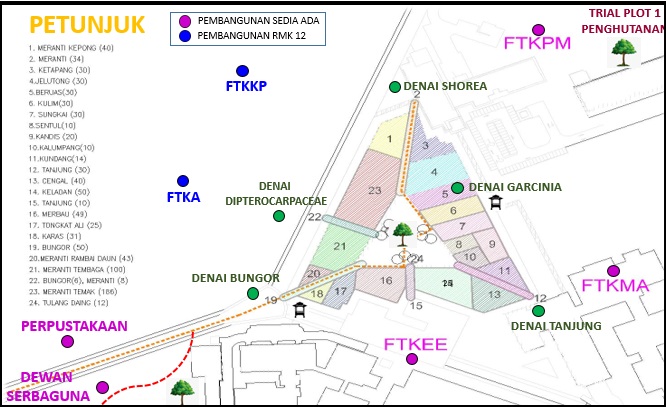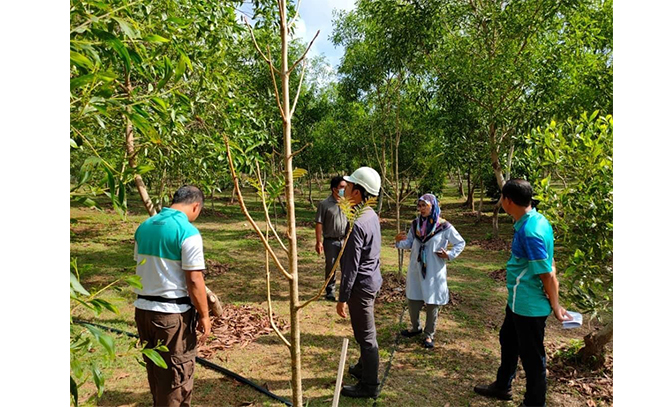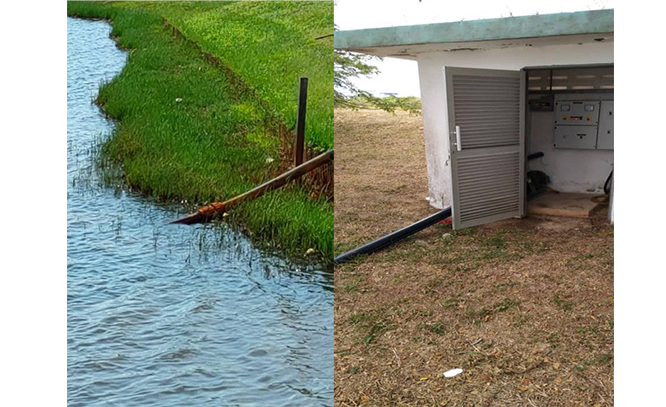Rimba Lestari Smart Irrigation System

Figure 1.0 : Afforestation program in UMP Pekan
Good irrigation systems for any farm require constant monitoring, especially in higher surrounding temperatures where water is scarce due to low rainfall indices. Nowadays, Farmers usually control the water flow through the semi-conventional method by using a water pump with a timer indicator. The timer setting frequently has been changed depending on surrounding temperature, soil moisture, time of the day, and health of the crops. This so-called semi-conventional method is also implemented by Universiti Malaysia Pahang (UMP) Afforestation program through its forest plantation and called Rimba Lestari UMP under Pusat Pembangunan dan Pengurusan Harta (PPPH) management. The design of an IoT for smart irrigation is essential in this dry area, which faces very high ambient temperature where the average temperature was 30ºC to 35°C according to AccuWheather.com. The proposed system utilizes a single board system on a chip controller, which has built-in Wifi Connectivity and/or any telecommunication signal provider. The controller reads the field soil moisture, humidity, and temperature sensors and outputs appropriate actuation command signals to operate irrigation pumps. The controller also monitors the pump water pressure/level which is essential to prevent the pump motor from burning due to the low level in the water lake. The system comprises two units of water pumps. The first one is by using the existing pump where water was pumped out of the lake and pipe into a proposed water tank and the second one is by using an irrigation pump for planting water/fertilizer distribution. The NPK fertilizer used in this project will be dilluted by batch in a tank based on specific water portion as consulted by FRIM expertise. The use of water from the lake may as well in line with UMP Green Campus's vision by reducing energy consumption through avoidance of wasteful consumption and by being more prudent in the use of energy, particularly the use of treated water from Pengurusan Air Pahang Berhad (PAIP). This smart irrigation system may also provide a better safety working environment to the workers by reducing the non value-added and motion waste.
To develop an afforestation program, Universiti Malaysia Pahang has sought the expertise of Forest Research Institute Malaysia (FRIM) to assist in this project to enhance the landscape of its campus and provide a more conducive environment for students. Almost 1000 forest plants with 24 different species were planted in UMP Pekan Campus in 2018. The size of the land was 4.1 acres. The area, later on, was called Rimba Lestari.
The extreme heat events impacted a wide variety of tree functions wherein high temperature almost 293 corps have died (see figures 2.0). The other factor that contributed to the tree death was the ineffective way of irrigation system monitoring (Ridwah MR et.al, 2019). A site visit was conducted on March 15, 2021, found no water pressure is detected from one of the pump houses near the Library. The pump is well function but there is a clogged along the piping line where the lake water is pumped out. The problem arose due to the inappropriate design of the piping system, as a backup, there is another water supply from PAIP treated water is consumed to ensure the survival of the trees (see figures 3.0). The existing irrigation system is not smart enough to ensure the survival rate of the plants due to inconsistent climate change. We conclude 3 most consecutive problem arise in this study and they are:
- The existing irrigation system use timer to distribute the water to the plant, some of the crops died due to insufficient water supply, especially during the dry
- Inappropriate monitoring system on pump operation may leads to pump burst due to clogging when the lake water is too shallow when the area experience high ambient
- The existing piping line from the point where the lake water is pumped out is not come with a floating and filtering system to ensure the smooth pump operating with no debris or forest mossy stuck inside the piping system.

Figure 2.0 : One of low survival forest tree in Rimba Lestari.

Figure 3.0 : Inappropriate water piping design with no floating and filtering system to prevent from unintended sedimentation lake debris e.g sand and moss.

